IOS ORGANISES NINTH QAZI MUJAHIDUL ISLAM MEMORIAL LECTURE ON “POPULAR SCIENCE IN URDU LITERATURE & ITS DISSEMINATION”
March 17, 2018 at Institute Building, 162, Jogabai, Jamia Nagar, New Delhi
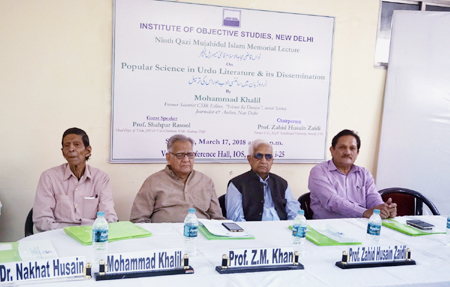
The ninth Qazi Mujahidul Islam Memorial Lecture on “Popular Science in Urdu Literature & its Dissemination” was organised by the Institute of Objective Studies at its conference hall on March 17, 2018. Dr. Mohammad Khalil, former scientist, CSIR and editor, Science ki Duniya, who delivered the lecture, surveyed the scientific writing in Urdu. He said that the first Prime Minister of India, Pandit Jawaharlal Nehru, laid the foundation of scientific and technological development by getting a science policy resolution passed in 1959. Nehru presided over the CSIR which controlled 40 laboratories. These laboratories laid the road map for industrial development of the country. Referring to the use of Urdu as a medium for acquiring scientific knowledge, he said that this could contribute a great deal to the change in the life-style of the common man. During the last 350 years, Europe made strides in scientific development with the result that the industrial revolution put it on the top of the world. This was not the case with Urdu, which was lacking in scientific literature. The first book on science in Urdu was Bahre Hikmah, which came out in 1798. The book was the Urdu translation of Parkinson’s work in English and contained information on measurements.
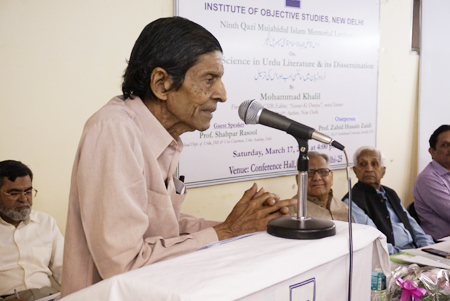
Mohammad Khalil observed that it was Sir Syed Ahmad Khan who first recognised the importance of knowledge of science and came to the conclusion that people could not progress till they kept abreast of scientific advancement. Keeping this in view, he got several books on science translated into Urdu. In furtherance of the quest for the propagation of science, he founded the Scientific Society in 1863 which pioneered the translation of 40 books. He said that the activities of the scientific society were not confined to translation of books; they also included maintenance of a laboratory, a model room and a museum. This shows Sir Syed’s foresight and his scientific temper that was keeping pace with the advancement of science and technology in Europe. Sir Syed was among those who closely watched the changing world scenario. He always endeavoured to disseminate scientific knowledge to the people in order to inculcate in them the need for its use in their daily life. Mohammad Khalil considered him as the harbinger of a new journalism that gave an impetus to the progressive scientific journalism. As a keen observer, he witnessed the world undergoing change, and was fully aware that the Muslim community had deeply immersed itself in legends. He firmly believed that they could not come out of backwardness till they received modern education.
Mohammad Khalil said that to promote scientific knowledge, Sir Syed brought out periodicals like, Tahzibul Akhlaq and Aligarh Institute Gazette. Later on, this was emulated by the Osmania University in Hyderabad where DarutTarjuma and Darul Ashaat took upon themselves the onus to disseminate scientific knowledge from 1917 to 1947. Similarly, the father of Urdu, Dr. Maulvi Abdul Haq, brought out the first magazine of science in Urdu called Science, from Hyderabad in 1927 under the stewardship of Anjuman Taraqqi Hind. He pointed out that both Sir Syed and Dr. Maulvi Abdul Haq ceaselessly strived to popularise science through Urdu language with the result that the Nizam of Hyderabad made Urdu the official language of the state. He also opened a science laboratory in Hyderabad which was re-named as Regional Research Laboratory later. The laboratory is now under the administrative control of the CSIR. He expressed the view that until the popular language and the language of science were the same, we could not hope that science would form part of our life. If our language corresponds to the language of science, the cultural heritage would become inclusive, giving a practical shape to the use of science, entirely different from the West.
Laying emphasis on the economic empowerment of Urdu-knowing people, Mohammad Khalil said that being in a minority, they must use scientific knowledge for their betterment. But the main handicap was the dearth of scientific literature in Urdu which badly reflected on the Urdu-knowing population. In order to fulfill this need CSIR brought out a quarterly magazine Science ki Duniya under the supervision of Prof. A Rahman, founder director of National Institute of Science, Technology and Development Studies in 1975. The magazine was edited by Urdu poet Anand Mohan Zutshi Gulzar Dehalvi. The magazine became a big success when noted scientists and scholars like the Nobel laureate, Dr. Abdus Salam, Prof. DS Kothari, Prof. AR Kidwai, Prof. Md. Shafi, Prof. RC Mehrotra, Prof. Zahoor Qasim, Prof. AC Misra, Prof. A Rahman, Prof. Baldev Singh, Prof. Nasim Ansari, Prof. AM Khusro, Dr. Krishna Lal, Prof. Zahid Husain Zaidi, Prof. Ehtesham Hasnain, Dr. Shamsul Islam Farooqi, Prof. Md. Shakeel, Prof. Arif Ali, Prof. Bilqis Bano and Dr. Obaidur Rahman, etc. contributed their articles. The magazine also published special numbers like “Nehru aur Science Number”, “CV Raman Number”, “Maholiyaat Number”. Another Urdu magazine on science, simply called as Science is being regularly published by the Islamic Foundation for Science and Environment since 1993. This is being edited by science journalist and vice-chancellor of Maulana Azad National Urdu University, Hyderabad, Dr. Mohammad Aslam Pervez. Mohammad Khalil expressed dismay that in spite of a large number of newspapers and childrens’ magazines being published in Urdu today, science content in them was lacking. He made out a strong case for increase in popular science content in newspapers and magazines.
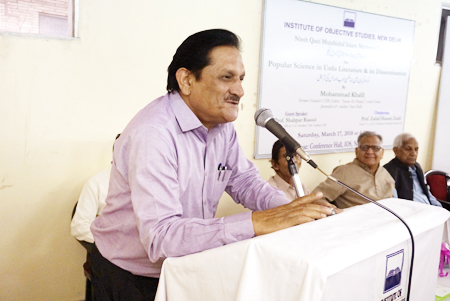
Head of the deptt. of Urdu, JMI and the vice-chairman of Delhi Urdu Academy, Prof. Shahpar Rasool, in his brief speech complained that people were not doing what was incumbent upon them. But it was a moral duty of every person to admit to his mistake. Referring to the efforts of the Delhi State Urdu Academy, he said that the awards instituted in different fields by the academy also included science fiction and children’s literature. He observed that Sir Syed Ahmad’s contribution to the production of science literature in Urdu was unforgettable as he got translated several books of science into Urdu. He said the books submitted to the Urdu Academy for awards did not measure up to the standards. He called for the production of standard literature in Urdu.
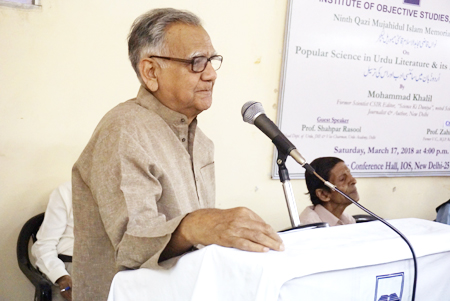
Secretary-General of IOS, Prof. ZM Khan, held that language did not move in a vacuum. Thus, there was a need for working on the linkages. The IOS had taken upon itself the responsibility to do its bit in that direction. He contended that the Muslims did have a scientific temper. It would be an exercise in futility if much was expected of them as the community was fighting for its survival. Assuring that the Institute of Objective Studies would not abdicate its responsibility to produce standard books in Urdu as our rich social, cultural and religious literature was preserved in the language. He sought the cooperation of scholars in this task.
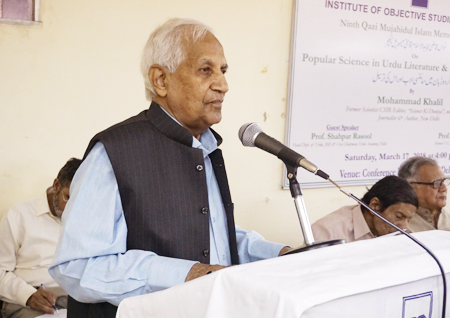
In his presidential remarks, former vice-chancellor of MJP Rohilkhand University, Bareilly (UP) and ex-professor of physics and dean, Faculty of natural sciences, JMI, Prof. Zahid Husain Zaidi, admired Mohammad Khalil for his contribution to the popularisation of Urdu by way of his writings on science and termed him as a true friend of Urdu and science. Expressing concern over the continuing decline of members of Urdu-knowing people, he impressed upon the community to make their children learn Urdu. He said that Dr. Abdus Salam wanted science books to be translated into Urdu and he (Prof. Zaidi) had the privilege to translate some of his books and speeches into Urdu. He commented that scientific temper was the gift of Arabs and it was the duty of Urdu-knowing people to write more and more in that language. One could not deny the utility of science as today Israel dominated the Arabs on account of its superiority in science and technology. Explaining the galaxy of planets, he said that every part of it was connected to the other. This was the balance in the cosmos maintained by nature. “We must find ways to put science into our life” he continued.
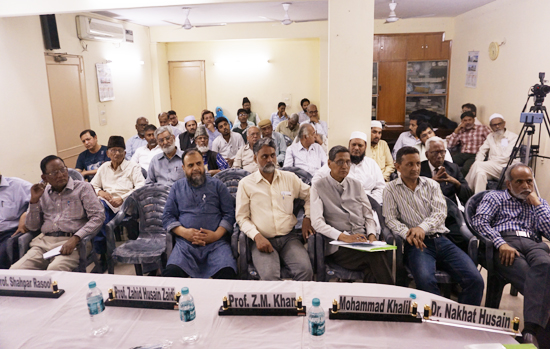
Earlier, Hafiz Athar Husain Nadvi recited a verse from the holy Quran along with its translation in Urdu. Dr. Nakhat Husain, in-charge, Arabic section, IOS, conducted the proceedings and extended a vote of thanks. A good number of scholars, university teachers and research scholars, social activists and prominent citizens, including the asstt. secretary general, IOS, Prof. M. Afzal Wani, finance secretary, IOS, Prof. Ishtiyaque Danish, and Islamic scholar, Maulana Abdul Hameed Nomani, attended the lecture.
|